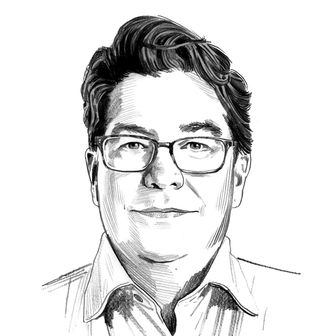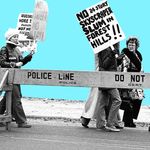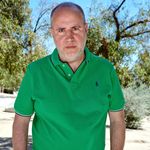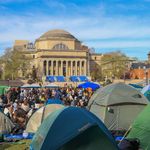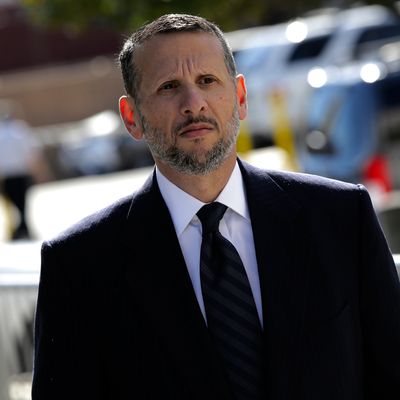
Governor Chris Christie offered personal approval for a campaign of retribution against two New Jersey mayors who refused to cross party lines and endorse his reelection, the convicted mastermind of the George Washington Bridge lane closures testified in a federal trial today. After prosecutors displayed a montage of photos, showing Christie laughing and rolling his eyes during a conversation with former Port Authority officials Bill Baroni and David Wildstein before a September 11 memorial service at the World Trade Center, Wildstein — Christie’s self-described former “enforcer” at the agency — recounted a conversation in which they discussed ways to make life difficult for the two Democrats, Mayor Steven Fulop of Jersey City and Mayor Mark Sokolich of Fort Lee.
The testimony, the most dramatic moment so far in the trial of Baroni and Bridget Kelly, Christie’s former deputy chief of staff, placed the governor and several of his top advisers squarely within the circle of those with contemporaneous knowledge of the plot to visit revenge on Sokolich by starting a massive traffic jam. (Christie would later say he was “blindsided” by his aides’ actions.) Although the governor’s defenders have sought to describe Wildstein — a confessed liar with a fondness for the dark arts of politics — as a rogue actor, the prosecution’s star witness offered a highly precise, even clinical account of his efforts to advance “the governor’s interests” by punishing the drivers of Fort Lee.
Prosecutors sought to place the bridge scheme within a broader culture of retaliation by showing how the Port Authority had previously taken similar — though far less extreme — actions against Fulop at the direction of Bill Stepien, Christie’s campaign manager. After Fulop declined to endorse Christie, Wildstein testified, the Port Authority ceased to deal with him on matters of importance to his town, refusing to even return his calls.
“Radio silence,” Stepien ordered Wildstein in July 2013, when Fulop wanted to set up a meeting. “Continue to ice him,” Stepien reiterated that August. When Fulop shortly afterward wrote to Baroni — his contact at the Port Authority — expressing annoyance, Stepien told Wildstein: “He’s getting a little snippy. Good.”
When the chairman of the Port Authority’s board, Christie appointee David Samson, wanted to have a peace talk with Fulop, the governor’s campaign manager quashed the idea. “Per Stepien,” Wildstein texted Baroni, “no meetings with Fulop. 100% Order that Fulop be frozen out comes directly from gov,” by which he meant Governor Christie, Wildstein explained. “Gov wants nobody to meet with Fulop.”
Though it is hardly uncommon for mayors and governors of opposing parties to have strained relations, Christie’s order to freeze out Fulop appears important in light of what else Wildstein was up to in August 2013: planning the Fort Lee traffic jam. Prosecutors made the connection explicit by citing a text exchange between Baroni and Wildstein. Wildstein had previously testified that Baroni had suggested that they time the Fort Lee traffic jam for the first day of school, to maximize the municipal chaos. On September 1 — a week before the George Washington Bridge closures — Baroni asked Wildstein when Jersey City schoolchildren were scheduled to return to class.
“Thursday,” Wildstein replied, after checking the internet.
“Anything we can do?” Baroni asked.
“Probably not,” Wildstein texted back.
“U fortunate,” Baroni replied.
On the stand, Wildstein testified that, “I understood that to be ‘unfortunate.’ That is a word Mr. Baroni used frequently.” The previously undisclosed communication was the first documentary evidence appearing to show that Baroni knew all along that Wildstein’s cover story in Fort Lee — that he was conducting a traffic study — was a ruse.
The callousness that the alleged conspirators showed toward the intended victims of their actions — kids on their way to school, commuters heading to work — was occasionally shocking. Wildstein testified that when the mayor of Fort Lee tried to reach Baroni, saying that ambulances were unable to respond to emergency calls, he saw it solely as a political gambit. “I told [Kelly] that I thought that was a smart political response from Mayor Sokolich to play the public-safety card,” Wildstein said. He said Baroni “mocked Mayor Sokolich” for his desperation and confusion about who was “mad at” him. The prosecution displayed one now-infamous exchange of texts between Kelly and Wildstein in which she said she felt bad about the children stuck in school buses.
“Ms. Kelly was feeling a little bit of empathy toward kids from Fort Lee who were having a little bit of trouble getting to school that morning,” Wildstein said. He then read out his own response: “They are children of Buono voters.” (Barbara Buono was the sacrificial lamb the Democratic Party ran against Christie in 2013.)
“Why did you feel comfortable saying that?” asked prosecutor Lee M. Cortes Jr.
“It’s a hard question to answer,” said Wildstein, who has grown children. “I shouldn’t have been comfortable saying it, it was a horrible thing to say.”
But prosecutors are building a case that seems to demonstrate that by engaging in vengeful tactics, Wildstein and the defendants were following cues sent to them by the governor and his top advisers. Wildstein testified that Baroni — his close friend — had been “a bit queasy, a bit nervous, second-guessing” prior to the lane closures.
“I told him not to be nervous,” Wildstein said. “This is what the governor’s office wanted.” Wildstein has claimed that several political figures close to the governor were briefed on the lane closures before they happened, including Stepien — now a Donald Trump campaign aide — and a Port Authority board member from the Fort Lee area. Wildstein testified that shortly before the lane closures, Baroni also told the authority’s chairman, Samson, about what they were up to. (Samson has since pleaded guilty to an unrelated criminal charge related to using his power at the Port Authority to pressure United Airlines to schedule what was known as the “chairman’s flight,” a special route from Newark to the airport nearest his vacation home in South Carolina.)
Finally, on September 11 — the third day of the bridge toll lane closures — Wildstein and Baroni had a chance to inform the governor himself. “Ms. Kelly had previously told me that the governor is going to love this,” Wildstein testified. “I remember the quote: ‘The governor is going to love this.’” So he and Baroni were eager to share the news when they had a few minutes alone with Christie, on a dirt path running across what was then still the World Trade Center construction site.
“Mr. Baroni said, ‘Governor I have to tell you about something,’” Wildstein testified, saying that Baroni and Christie often adopted a “very sarcastic tone” when they were talking politics. “Mr. Baroni said to Governor Christie, ‘Governor, I can tell you there’s a tremendous amount of traffic in Fort Lee this morning, major traffic jams, and Mayor Sokolich is very frustrated.” He alleged that Baroni then added, “you’ll be pleased to know that Mayor Sokolich is having trouble getting his telephone calls returned.”
According to Wildstein, Christie replied with similar sarcasm, “I imagine he wouldn’t be getting his phone calls returned.”
Wildstein had previously testified that at the Port Authority, he and Baroni operated according to what they called the “one-constituent rule,” meaning that everything they did was for the governor’s benefit. He and Christie had been acquainted since they attended high school together, and the governor was well aware of Wildstein’s talent for Jersey-style political subterfuge, shown both as a small-time political operative and an influential anonymous blogger with a tendency to pursue obscure vendettas. The governor still called Wildstein by the pseudonym he used on the website, “Wally Edge.” So Christie surely understood the import of what Baroni allegedly told him next:
“Mr. Baroni said to Governor Christie that I was monitoring the traffic, I was watching over everything,” Wildstein testified. “Governor Christie said in the sarcastic tone of the conversation, ‘Well. I’m sure Mr. Edge would not be involved in anything political.’”
Then, Wildstein said, “he laughed.”
After a few minutes, Wildstein testified, Samson also showed up, and brought up the proposed meeting with Mayor Fulop. Christie responded with a firm command: No communications. “Governor Christie referred to Mayor Sokolich as well,” Wildstein said, giving the order “that the Port Authority wasn’t going to talk to with either mayor.”
In the end, it isn’t clear whether the traffic jam succeeded, even in the narrowest terms, as a revenge plot. Wildstein testified that Sokolich seemed not to understand the message that was being sent to him. “I remember being a little confused about him not necessarily understanding who is mad at him,” Wildstein testified. But before long, everyone would know. Wildstein spent much of the afternoon describing, in painful detail, how the alleged conspiracy unraveled, ultimately destroying his career, along with those of his former friends Kelly and Baroni. Wildstein described how, in those moments at the World Trade Center, he had been “bragging,” reveling in his fleeting success.
“This was our one constituent. I was pleasing my one constituent,” Wildstein said. “I was proud of it. I was happy that he’s happy.”
After the encounter with Christie, he added, Baroni never again expressed queasiness.


